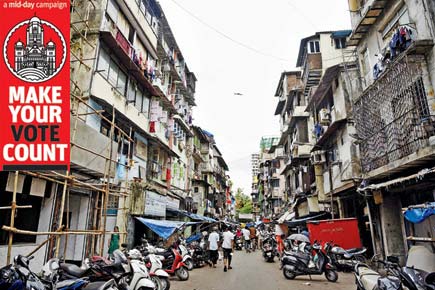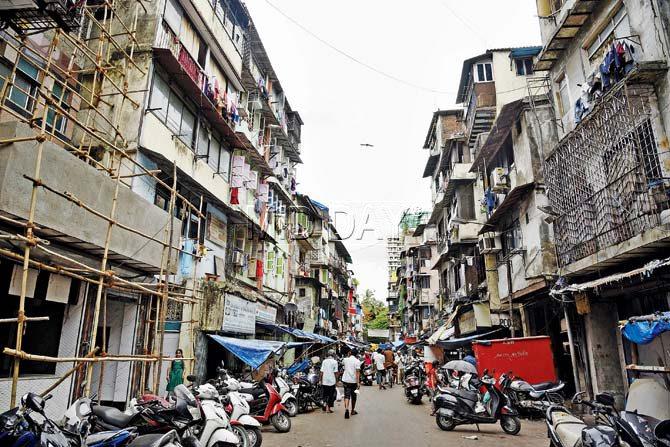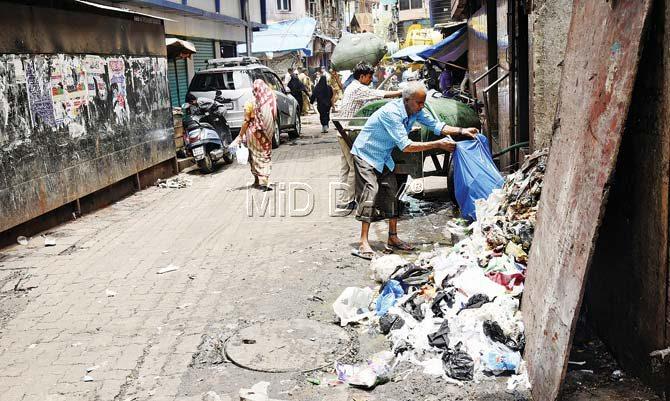Everyone flocks to B-ward’s Mohammed Ali Road to feast on Ramzan delicacies, but the rest of the year, this neglected SoBo ward struggles for basic rights such as clean surroundings and drinking water

 South Mumbai’s B-ward may not have the SoBo vibe, but this is where the who’s who of the city flock to when they want to sample Ramzan delicacies at Mohammed Ali Road.
South Mumbai’s B-ward may not have the SoBo vibe, but this is where the who’s who of the city flock to when they want to sample Ramzan delicacies at Mohammed Ali Road.
ADVERTISEMENT

B-ward is home to 1.4 lakh people, who live in century-old buildings packed together with hardly any space in between. Many of these buildings are barely standing with the help of temporary repairs
But the land of biryani and falooda is plagued with its own problems, some as basic as the lack of clean drinking water.
Once known as the seat of the D-company, there is little left of those days in this ward now. Home to a predominantly Muslim population, B-ward spans across a modest 2.84 sq km but is densely populated. According to the 2001 census, a good 1.4 lakh people live here in century-old buildings that are packed into this small area, with barely any space in between. The narrow streets and footpaths are further choked by bustling wholesale markets and labourers pushing around loaded handcarts.

Residents complained that not only is the corporation irregular in collecting trash, the sweepers often leave piles of garbage on the street side instead of taking it away directly. Pics/Shadab Khan
Building bane
There is very little regulation on buildings in this area, whether it comes to crumbling wooden structures that were built a hundred years ago, or the newer illegal structures that are now seen mushrooming across the ward.
Many of the older buildings are in a dilapidated condition and are potential fire traps. The buildings are wooden, two or three-storeyed structures with narrow entrances and wooden staircases. Add to that the loose electric wiring, short circuits and illegally-hoarded LPG cylinders, and it’s a recipe for a disaster like the Kalbadevi blaze last year.
The structural stability of these buildings is also questionable and many of them are standing on temporary repairs and scaffoldings. Temporary structural repairs have been done by tenants but they are all awaiting redevelopment.
Besides that, the ward also witnesses rampant illegal construction. mid-day had reported recently how a four-storey building in Dongri was extended to 11 floors without any legal permissions. Such buildings dot the entire ward and demolishing them is a task.
Reeking rubbish
The buildings are packed so close together that there’s barely a couple of feet between them. These narrow gullies between the houses have become an easy target for residents looking to get rid of their rubbish. Over time, the trash accumulates and then begins to stink and also invites diseases. Residents have complained that civic workers do not clean these gullies regularly. When they do, the sweepers often leave piles of garbage on the street side instead of taking it away directly. Locals also complained that door-to-door collection of trash is not done on a regular basis.
Water war
Despite having legal, metered connections, citizens here have been deprived of clean drinking water. Not only do they get water supply for a very brief duration, the first few minutes usually yield dirty, discoloured water. In the short time that they do get clean water, resident have to clamour to get their fair share.
One of the reasons for the dirty supply is that the water pipelines run beneath the gullies between the buildings, along with the sewage pipelines. The pipes have leakages and contaminated water flows from one pipeline into the other.
 Subscribe today by clicking the link and stay updated with the latest news!" Click here!
Subscribe today by clicking the link and stay updated with the latest news!" Click here!






